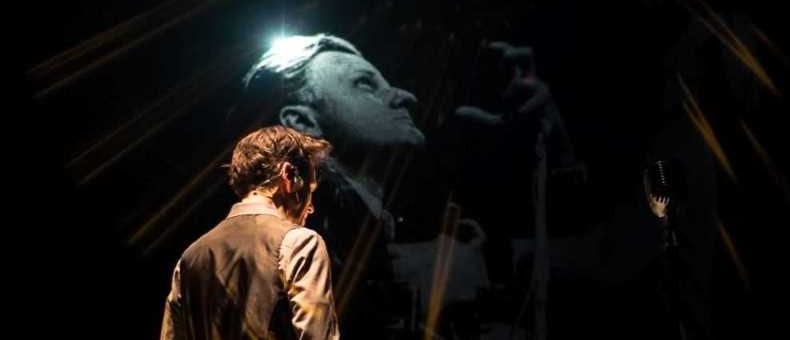“Ok boomers,” I have to hand it to you — the music you grew up with can’t be beat, no pun intended. “Young Blood” I may be, but a “Piece of My Heart” will appreciate the legacy it left “Till the End of Time” even if the rest of “My Generation” does not, “For Sentimental Reasons.” (Puns fully intended.) But sentimentality is only a small part of Rick Miller’s immortalization of these iconic tracks in BOOM.
BOOM, directed, written and performed entirely by Miller, is a fast-paced flyover through 25 years that define the baby boomer generation: 1945-1969. Miller and a projection screen join forces to present a streamlined collection of individual moments that define the era. He touches upon nuclear arms, civil rights, the space race and more, all underscored by the music released in the midst of it all. The tracklist is marked with a spoiler warning in the program, so if you don’t want to know any more of the songs or events Miller incorporates, stop here. (I don’t believe American history counts as a spoiler, but if you do, this is your alert.)
If all my history teachers were as animated as Miller — and could do impressions of all the people they lectured about like Miller can — I’d probably wouldn’t have thought the subject a bore growing up. He inhabits more than 100 people in about that many minutes: politicians, TV personalities, journalists (to my delight), and of course, dozens of musicians representing rock n’ roll, blues, folk and country. There were surprisingly few moments where the constant jumping between characters left me confused. Miller’s self-direction through the transitions is choppy at times, but it’s almost always clear where in time and with what character we are. (Years and names are often projected on the screen for good measure.)
When he isn’t nailing Janis Joplin’s belt or the creepily over-the-top enthusiasm of the face of Tupperware commercials, he’s cracking jokes about politics both then and now, often as American ones collide with those from his home country of Canada. Think the Trudeaus being referred to as “a father figure and a weird counter-culture sex symbol” and “a rockstar politician,” respectively, in back-to-back sentences.
The Gen-X Miller didn’t live through the BOOM era himself, so he embodies three people, each differentiated by a trademark voice and a consistent position onstage, that did: Miller’s father, Rudi; his mother, Maddie; and his mother’s college boyfriend, Laurence. Their own family history is part of BOOM, but it largely takes a backseat. Recollections about celebrities and events — most notably, Maddie’s on Elvis Presley: “Oh my God. Those hips. I had never seen anyone move like that before. Mom actually tried to cover my eyes” — dominate the narration until the end.
For me, it was ultimately most interesting to observe the show’s real-time resonance among my fellow audience members: the baby boomers themselves, watching the world of their youth be replayed before them. Mentions of American Bandstand and Beefaroni elicited chuckles and murmurs from the audience. Miller’s mention of “duck and cover” drills drew an equally vocal, yet more somber, response as people presumably remembered being made to do them as schoolchildren.
Miller says himself that BOOM isn’t meant to be an impersonation act or a musical revue, the implication being that it’s not meant to be a purely lighthearted romp. He succeeds; it is not. There’s a clear, grave undertone that pervades this production, and it comes from Miller’s emphasis on the music’s ties to the political climate from which it was born. We shimmy our shoulders a little in our seats as “Blue Moon” underscores Kennedy’s hopeful “Man on the Moon” speech — right before the lights go black except for one phrase projected on the screen: “The Vietnam War officially begins.” Earlier, Miller belts a joyful Nat King Cole ditty while a headline about a black lynching is shown.
Conversely, Miller ties up Act 1 with the plane crash that killed Buddy Holly, Ritchie Valens and J.P. Richardson, choosing (what else) “American Pie” as the moment’s musical pairing. I may not have lived through the event like McLean or those around me, but “American Pie” happens to be my favorite song, and as Miller began to play I immediately felt a strong urge to sing along. And then he invited us to do just that. It seemed like everyone knew the words, and the melancholy song was imbued with joy as Miller led our impromptu chorus, a chorus with the power to bridge generations.
BOOM is no mere nostalgia machine. To borrow a phrase from Joni Mitchell, it’s more of a circle game: the show evokes just as much wariness of the past as it does fondness, and it acknowledges those same feelings toward the equally tumultuous present. Laurence’s observation that “fear is what keeps the wheels of freedom turning” still reverberates. And as a way of celebrating, of coping, of calling to action, people are going to sing about it. We’d better listen.

